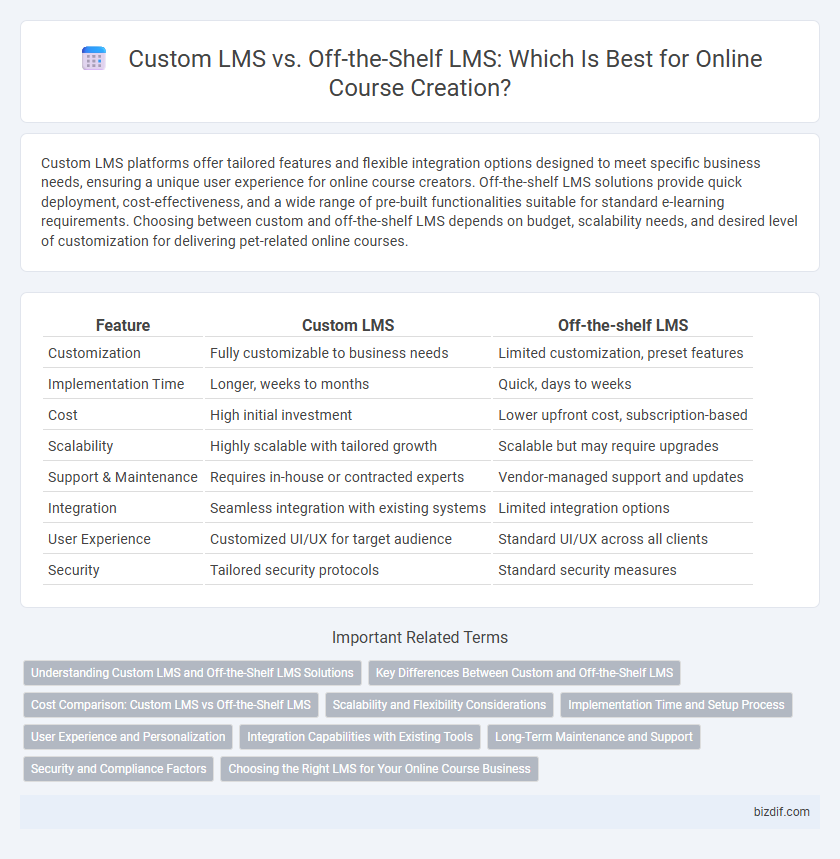Custom LMS platforms offer tailored features and flexible integration options designed to meet specific business needs, ensuring a unique user experience for online course creators. Off-the-shelf LMS solutions provide quick deployment, cost-effectiveness, and a wide range of pre-built functionalities suitable for standard e-learning requirements. Choosing between custom and off-the-shelf LMS depends on budget, scalability needs, and desired level of customization for delivering pet-related online courses.
Table of Comparison
| Feature | Custom LMS | Off-the-shelf LMS |
|---|---|---|
| Customization | Fully customizable to business needs | Limited customization, preset features |
| Implementation Time | Longer, weeks to months | Quick, days to weeks |
| Cost | High initial investment | Lower upfront cost, subscription-based |
| Scalability | Highly scalable with tailored growth | Scalable but may require upgrades |
| Support & Maintenance | Requires in-house or contracted experts | Vendor-managed support and updates |
| Integration | Seamless integration with existing systems | Limited integration options |
| User Experience | Customized UI/UX for target audience | Standard UI/UX across all clients |
| Security | Tailored security protocols | Standard security measures |
Understanding Custom LMS and Off-the-Shelf LMS Solutions
Custom LMS solutions offer tailored features and integration capabilities designed to meet specific organizational needs, allowing for greater flexibility in course design, user management, and reporting. Off-the-shelf LMS platforms provide pre-built, standardized tools that enable faster deployment and lower initial costs but may limit customization and scalability. Choosing between custom and off-the-shelf LMS depends on factors like budget, technical requirements, and long-term growth objectives in online course creation.
Key Differences Between Custom and Off-the-Shelf LMS
Custom LMS offers tailored features and scalability designed to meet specific organizational needs, whereas off-the-shelf LMS provides ready-made solutions with limited customization. Custom LMS often requires higher initial investment and longer development time, while off-the-shelf LMS ensures faster deployment and lower upfront costs. Choice depends on factors such as budget, desired flexibility, and long-term learning strategy.
Cost Comparison: Custom LMS vs Off-the-Shelf LMS
Custom LMS development involves higher upfront costs due to tailored design, development, and maintenance but offers long-term scalability and brand alignment. Off-the-shelf LMS solutions typically feature lower initial expenses with subscription-based pricing, yet may incur hidden costs through limited customization and additional licensing fees. Evaluating total cost of ownership reveals custom LMS as a strategic investment for growing organizations, while off-the-shelf serves best for businesses seeking immediate deployment and budget simplicity.
Scalability and Flexibility Considerations
Custom LMS solutions offer unparalleled scalability and flexibility, allowing businesses to tailor features and user experiences specifically to their growing needs and unique workflows. Off-the-shelf LMS platforms provide quicker deployment but often lack the customizable scalability required for rapidly expanding user bases or specialized training programs. Scalability in custom LMS enables seamless integration of new modules, while flexibility ensures adaptation to evolving educational strategies without compromising system performance.
Implementation Time and Setup Process
Custom LMS platforms require a longer implementation time due to tailored development and extensive setup processes that align specifically with organizational needs. Off-the-shelf LMS solutions offer faster deployment with pre-configured features and standardized setup procedures, allowing users to start course delivery almost immediately. Choosing between the two depends on balancing the need for customization with the urgency of launch timelines.
User Experience and Personalization
Custom LMS platforms offer superior user experience and personalization by allowing tailored interfaces, course structures, and features that align precisely with specific learner needs and organizational goals. Off-the-shelf LMS solutions provide ease of deployment and standardized features but often lack the flexibility to adapt to unique user preferences or branding requirements. Investing in a custom LMS enhances engagement and learning outcomes through personalized content delivery and adaptive user journeys.
Integration Capabilities with Existing Tools
Custom LMS platforms offer seamless integration with existing tools like CRM, analytics, and marketing software, enabling a tailored workflow that enhances operational efficiency. Off-the-shelf LMS solutions often provide limited integration options, relying on pre-built connectors that may not fully support unique business processes. Prioritizing integration capabilities ensures smoother data synchronization and a cohesive user experience across all educational and administrative systems.
Long-Term Maintenance and Support
Custom LMS solutions offer tailored long-term maintenance and support, allowing seamless updates and integrations that align with evolving business needs and technological advancements. Off-the-shelf LMS platforms often provide standardized support and regular updates but may lack flexibility and customization, potentially leading to limitations in scalability and user experience over time. Investing in a custom LMS can reduce dependency on third-party vendors and ensure sustained alignment with organizational goals.
Security and Compliance Factors
Custom LMS platforms offer enhanced security measures tailored to specific organizational requirements, enabling precise control over data protection and compliance with industry regulations such as GDPR, HIPAA, or FERPA. Off-the-shelf LMS solutions provide standardized security features that may not fully align with unique compliance needs, potentially exposing sensitive information to vulnerabilities. Organizations prioritizing stringent data security and regulatory adherence often prefer custom LMS development for comprehensive risk management and audit capabilities.
Choosing the Right LMS for Your Online Course Business
Custom LMS platforms offer tailored features that align precisely with your unique course content and business goals, ensuring maximum flexibility and branding control. Off-the-shelf LMS options provide cost-effective, quick deployment with proven reliability and pre-built integrations, ideal for businesses prioritizing speed and simplicity. Evaluating factors like scalability, customization needs, budget constraints, and user experience helps determine the most suitable LMS for your online course business.
Custom LMS vs Off-the-shelf LMS Infographic

 bizdif.com
bizdif.com